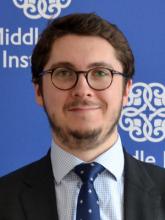In this week's Monday Briefing, MEI experts Charles Lister, Gerald Feierstein, Eran Etzion, and Alex Vatanka provide analysis on recent and upcoming events including the resumption of Syria talks in Geneva, President Trump's upcoming visit to Saudi Arabia and Israel, and the latest developments in the home stretch of Iran's presidential election.
Syria Talks Resume in Geneva
Charles Lister, Senior Fellow
A new four-day round of Syria peace talks will begin in Geneva on Tuesday, but the chances of progress are slim at best. In current dynamics, no major player in a position of influence on the outcome has any clear interest in seriously pursuing it. For now, the international community’s energy would be better focused on military talks aimed at de-escalating the conflict on the ground in order to generate conditions more amenable to a meaningful political process.
In theory, Russia’s Astana process seeks this military-focused objective, but in reality, Astana is directly facilitating further Assad gains and encouraging deeper opposition division. The U.N.-led Geneva process meanwhile, is still based on the principles of U.N. Security Council Resolution 2254, and therefore, still seeks some form of political transition in Syria, which the Assad regime has zero interest in considering. In fact, Assad himself has declared this week’s Geneva talks as “nothing substantial,” claiming it’s “merely a meeting for the media.”
The U.S. State Department’s declassification of satellite imagery appearing to show the Assad regime disposing bodies of executed prisoners in a crematorium is a clear attempt to pressure Russia to exert more leverage on the Assad regime. However, it remains unclear whether Moscow has any further leverage to use. Ultimately, Assad is in the driving seat and if there is any state doing the driving, it’s Iran, not Russia.
Given this state of affairs, it would be safe to assume that Geneva will change very little, and that continued attempts to push politics with no muscle will see the Assad regime gain further advantage on the ground.
Saudis to Give Warm Welcome to Trump
Gerald Feierstein, Director of the Center for Gulf Affairs
President Trump will hear nothing but warm words and reassurance during his stop in Saudi Arabia next week. For the Saudis, this is nothing less than their duty as his hosts. But it reflects, as well, their optimism that the Trump administration will reverse the Obama administration policies they found troubling.
In particular, the Saudis and the other Arab and Islamic leaders with whom Trump will meet, will appreciate Trump’s determination to avoid any uncomfortable issues, including respect for human rights and civil liberties. Meanwhile, each side will welcome the mutual commitment to confront and reverse Iran’s expansionist policies. For the Saudis, this means not only the announcement of a major new arms sale, but reinforcing U.S.-Saudi cooperation in the fight against Iran’s interference in Yemen.
Even in potentially sensitive issues of religious extremism, where many of Trump’s supporters believe Saudi Arabia’s Salafist Islamic sect is the well-spring of violent jihad, and the Israeli-Palestinian conflict, the president will be reassured by his Saudi and Islamic interlocutors. The Saudis will emphasize their long-standing commitment in the fight against global jihadist groups, as well as their efforts to promote interfaith relations through the King Abdullah bin Abdul Aziz International Center for Interfaith and Intercultural Dialogue in Vienna. On the peace process, the Saudis, Emiratis and other Arab leaders will be supportive, if non-committal on Trump’s strategy.
Presidents facing domestic turmoil in their own capitals often find solace traveling abroad. Donald Trump will fare no differently. For the Saudis and other Arabs, Trump’s relations with Russia and the attendant controversy is a problem far, far away. He will pass his entire time in the kingdom without ever hearing from his hosts the words “James Comey.”
Trump and the Peace Process—New Player, Old Games
Eran Etzion, MEI Scholar

President Donald Trump’s upcoming visit to Saudi Arabia, Israel and the Palestinian Authority has put the region’s leaders on high alert. The quickly formed consensus about Trump seems to be inherently contradictory. He is considered totally unreliable, but simultaneously the great new hope for a revived peace process, and an old-new regional coalition against ISIS and Iran.
The new player is thus proverbially squeezed by the region’s veterans into the age-old paradigms of “two states solution” and “Sunni coalition.” It was only a month ago that Trump noted publicly, almost in passing, “two states, one state, whatever you prefer.” It now seems that the combined weight of Riyadh, Cairo, Amman and Ramallah, with some help from old hands in Washington and Tel Aviv had managed to tilt Trump—if only temporarily—toward them.
The region is abuzz with speculation about a Trump regional peace initiative, using the Arab initiative and the need to combat ISIS and confront Iran. It is remarkable how little has changed in the fundamental assumptions underlying this logic. Successive U.S. administrations from Bush senior through Obama have all attempted to transform the region on almost the exact same basis.
This time, it hinges on a particularly weak triangle—Prime Minister Benjamin Netanyahu has no political base for peace, and is facing multiple criminal investigations; Abu Mazen is taking his last political breaths; and Trump is bound to lose interest, and get distracted long before any real move becomes possible.
Rouhani Pulls Out All Stops in Presidential Race
Alex Vatanka, Senior Fellow
Even though President Hassan Rouhani has never publicly proclaimed himself to be a reformist, his 11th-hour campaigning has been peppered with slogans that have fired up Iran’s vast reformist camp. Rouhani’s repeated hints that political prisoners should be freed, and his hardline rivals are hell bent on militarism and confronting the world has moved him firmly closer to the reformist spirit of detente. This is an achievement for a man who has never been seen by the reformists as one their own.
But Rouhani’s hardline rival, Ebrahim Raisi, is anathema to reformists, and the incumbent president hopes this fear will translate into a higher voter turnout, which no doubt benefits Rouhani. The last-minute withdrawal of another hardline candidate, Mohammad Bagher Qalibaf, in favor of Raisi, shows that the otherwise fragmented hardline camp is determined to stop a second Rouhani term.
This is why the reformist camp is alarmed by the prospect of large-scale fraud in favor of Raisi, given that many unelected but powerful state agencies are in the hands of the hardliners. Most notably, the powerful generals from the Islamic Revolution Guards Corps (I.R.G.C.) are blunt in their animus toward Rouhani. But a massive voter turnout makes election fraud that much harder. In their quest to encourage voters, Mohammad Khatami, Iran’s bona fide reformist president from 1997 to 2005, has been brought out by the Rouhani camp to take them to the finishing line. The move shows that Rouhani needs all the push he can secure to face off the 56-year-old Raisi.
The Middle East Institute (MEI) is an independent, non-partisan, non-for-profit, educational organization. It does not engage in advocacy and its scholars’ opinions are their own. MEI welcomes financial donations, but retains sole editorial control over its work and its publications reflect only the authors’ views. For a listing of MEI donors, please click here.
















